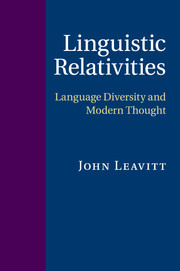Book contents
- Frontmatter
- Contents
- Preface
- Introduction
- 1 A passage to modernity
- 2 One reason, one world, many monads
- 3 The world at war with reason: Britain and France in the eighteenth century
- 4 Multiplicity and the Romantic explosion
- 5 Essences and universals through the nineteenth century
- 6 Boas and the linguistic multiverse
- 7 Linguistic relativity: Sapir, Lee, and Whorf
- 8 The other side of the mirror: a twentieth-century essentialism
- 9 The rise of cognition and the repression of languages
- 10 The return of the repressed
- Conclusion
- Notes
- References
- Index
10 - The return of the repressed
Published online by Cambridge University Press: 04 April 2011
- Frontmatter
- Contents
- Preface
- Introduction
- 1 A passage to modernity
- 2 One reason, one world, many monads
- 3 The world at war with reason: Britain and France in the eighteenth century
- 4 Multiplicity and the Romantic explosion
- 5 Essences and universals through the nineteenth century
- 6 Boas and the linguistic multiverse
- 7 Linguistic relativity: Sapir, Lee, and Whorf
- 8 The other side of the mirror: a twentieth-century essentialism
- 9 The rise of cognition and the repression of languages
- 10 The return of the repressed
- Conclusion
- Notes
- References
- Index
Summary
What has collapsed has not necessarily been superseded.
Trabant (1986: 206)The previous chapter sought to set the record straight on what I take to be misrepresentations of linguistic relativity over several decades from the 1950s. In this chapter we look at some ways in which key elements of the Boasian project survived and eventually grew again. The chapter has three parts: we look first at some other schools of thought that sought to account for sociocultural and linguistic diversity without falling into either universalist or essentialist patterns; we then look at ways in which the Boasian heritage came to be preserved through the height of cognitive hegemony; and finally we examine how this heritage has been revived dramatically, notably within cognitive science itself, especially since the late 1990s.
Once in a while during the period just considered, someone from outside would look at the controversy and wonder about the heaps of condemnation of linguistic relativity and particularly of Whorf. A case in point is the literary theorist George Steiner, who in 1975 called Whorf's work “the crowning statement” of the Leibniz–Humboldt “monadist” case, a theory
of great intellectual fascination. The “metalinguistics” of Whorf have for some time been under severe attack by both linguists and ethnographers. It looks as if a good deal of his work cannot be verified. But [his] papers … constitute a model which has extraordinary intellectual elegance and philosophic tact. They are a statement of vital possibility, an exploration of consciousness relevant not only to the linguist but also to the poet and, decisively, to the translator.
(1975:88)- Type
- Chapter
- Information
- Linguistic RelativitiesLanguage Diversity and Modern Thought, pp. 189 - 211Publisher: Cambridge University PressPrint publication year: 2010



